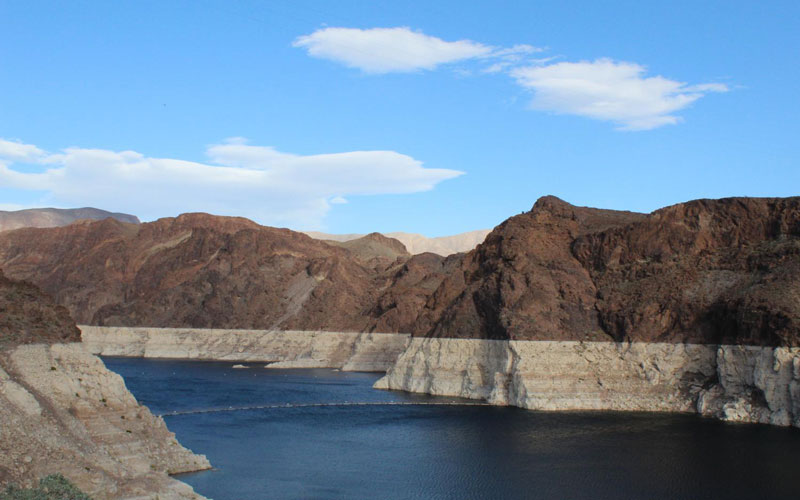
Lake Mead has been dropping for years, and if it dips too low, dramatic cuts in water delivery in the Lower Colorado River Basin would be required under previous agreements. (Photo by Luke Runyon/KUNC)
PHOENIX – The last day of January looked like a banner day for Arizona’s water planning. Lawmakers had passed legislation authorizing Arizona to enter into an important deal, and Gov. Doug Ducey signed the bills almost immediately.
“Working together with a common goal in mind, there’s no limit to what we can achieve. And today proves it,” he pronounced to the applause and relief of leaders gathered in the old state Senate chamber where the ceremony took place.
The Drought Contingency Plan for the Colorado Basin is designed to keep water in Lake Mead and reduce its chance of dropping rapidly, which would trigger a series of deep cuts to the Lower Basin states. As a bonus, this milestone came on the date the federal government had set as a deadline of sorts.
The next day, however, the Bureau of Reclamation, which manages water and power production in the West, said the deadline wasn’t met.
“Close isn’t done,” Commissioner Brenda Burman told reporters on a conference call. “Despite yesterday’s historic legislation, neither Arizona nor California have completed all of the necessary work to approve the DCP.”
Arizona has 15 related agreements and contracts to finish, between tribes, water districts, cities and others. And the Imperial Irrigation District in Southern California is trying to secure funding to help the shrinking Salton Sea, a prime recreational area that also has environmental issues from decades of farm runoff.
As Arizona and six other Basin states inch closer to finishing the plan to protect Lake Mead, the Bureau of Reclamation is moving forward on a parallel track that would create a federal plan in case the states don’t finish by the deadline.
But what is the deadline?
The unclear deadline
On Feb. 1, Burman gave everyone another month to wrap up. But March 4 now has passed as well.
Reclamation now is accepting input from governors in the Basin on what kind of alternate plan the Department of Interior should install if needed. That input is due March 19 – another deadline.
Meanwhile, Arizona continues to work on its various agreements.
Last month, Ted Cooke, general manager of the Central Arizona Project, told reporters Arizona wouldn’t be done by March 4.
“That’s an artificial deadline and these are very complex agreements and very complex negotiations,” he said. “We will take the time we need to do them properly. That being said, I don’t expect it to drag on for months and months and months.”
At the time, Cooke was confident all of Arizona’s internal deals would be done before the end of April, but he said it wasn’t clear what the federal government considered “done.”
“We do not have a clear list of things that need to be completed by that day.” he said, referring to March 4.
Reclamation didn’t specify which of Arizona’s separate agreements absolutely must be signed, sealed and delivered for the state to join Colorado, Wyoming, New Mexico, Utah and Nevada in the “done” column. On the Feb. 1 conference call, however, Commissioner Burman did say all agreements need to be complete.
The absolute deadline
Estevan López, who was Reclamation commissioner from late 2014 until the end of the Obama administration, said he would want all of the subagreements to be signed “so that nobody can get cold feet and say, ‘Oh, wait a minute. I want to change this aspect of it.’ Because then, one little thread starts unraveling the whole thing.”
López said a contingency plan, regardless of whether the basin states or the feds write it, absolutely needs to be in place by the time a crucial annual report is released in early August. The August 24-Month Study tells water users in the basin the projected level of Lake Mead and what delivery cutbacks the states must take under previous water agreements. That makes August the ultimate deadline.
Burman has made it clear she wants the Drought Contingency Plan to come from the states – and they may well get there. But just in case, the parallel federal process is moving forward.
“She’s doing it. She’s doing it incrementally,” López said of Burman. “But if things don’t come together by July or August, I think Reclamation will do something.”
If it came to that, the states could contest the broad authority over the Colorado River that federal officials have wielded. We know no one wants it to come to that, especially not for a river system that supplies water to about 40 million people.
But until we get there, we’re likely to keep hearing about deadlines.
This story is part of Elemental: Covering Sustainability, a new multimedia collaboration between Cronkite News, Arizona PBS, KJZZ, KPCC, Rocky Mountain PBS and PBS SoCal,
This story is part of Elemental: Covering Sustainability, a multimedia collaboration between Cronkite News, Arizona PBS, KJZZ, KPCC, Rocky Mountain PBS and PBS SoCal. It is part of ongoing Colorado River coverage in partnership with KUNC in Colorado and supported by a Walton Family Foundation grant.
Connect with us on Facebook.
